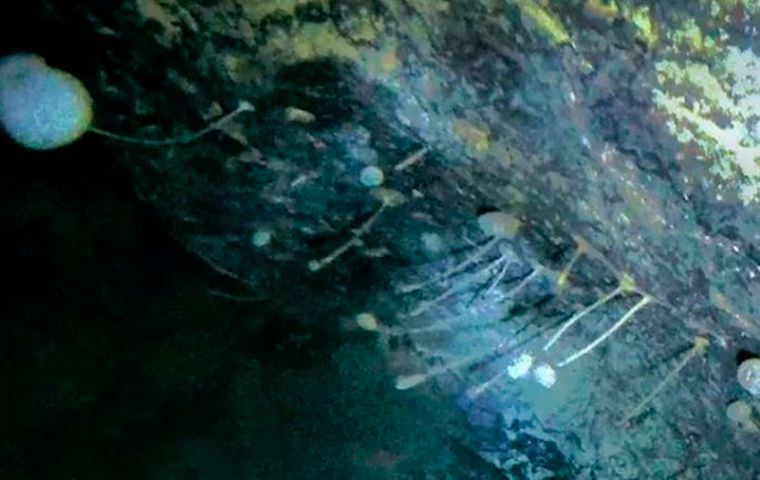MercoPress. South Atlantic News Agency
Strange living creatures found in Antarctica
 Scientists found a rock at the bottom of the ocean with strange creatures clinging to it
Scientists found a rock at the bottom of the ocean with strange creatures clinging to it A team of geologists found a group of creatures in an area of Antarctica where life was deemed near to impossible, it was reported.
After an exploratory study by drilling 900 meters of ice on the Filchner-Ronne shelf, located in the southeastern Weddell Sea, at a distance of 260 kilometers from the open sea, in complete darkness and temperatures of -2.2°C, the researchers found these creatures.
Some small predators and mobile scavengers, such as fish, worms, jellyfish, or krill. had been found in similar settings on previous occasions.
But this time around, the scientists found a rock instead of mud at the bottom of the ocean, and they were even more surprised when they found strange creatures clinging to it.
Biogeographer and lead author of the study, Huw Griffiths of the British Antarctic Survey, raised all sorts of questions via a statement. “Our discovery raises many more questions than it answers, for example, How did they get there? What are they eating? How long have they been there? How common are these covered boulders in life? Are these the same species we see out on the ice shelf or are they new species? And what would happen to these communities if the ice shelf collapsed?” Griffiths pondered.
It was also the first record of a hard substrate (a rock) community deep within an ice shelf.
“To answer our questions, we will have to find a way to get close to these animals and their environment, and that is under 900 meters of ice, 260 kilometers from the ships where our labs are. As polar scientists, we will have to find new and innovative ways to study them and answer all the new questions we have,” added the scientist.
Floating ice shelves represent the largest unexplored habitat in the Southern Ocean. They cover more than 1.5 million square kilometers of the Antarctic continental shelf, but only a total area similar in size to a tennis court has been surveyed through eight previous boreholes.
Current theories about what life might survive beneath the ice shelves suggest that all life becomes less abundant as it moves away from the open ocean and sunlight.


Top Comments
Disclaimer & comment rulesCommenting for this story is now closed.
If you have a Facebook account, become a fan and comment on our Facebook Page!